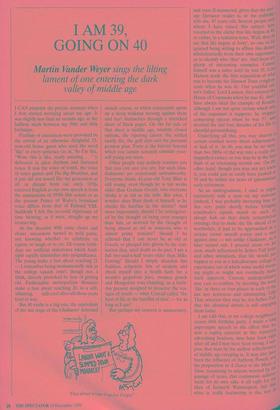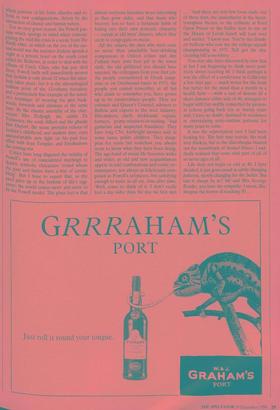I AM 39, GOING ON 40
Martin Vander Weyer sings the lilting
lament of one entering the dark valley of middle age
I CAN pinpoint the precise moment when I first started worrying about my age. It was slightly less than six months ago, at the halfway mark between my 39th and 40th birthdays.
Feelings of uneasiness were provoked by the arrival of an otherwise delightful 23- year-old house guest who used the word 'like' in every sentence (as in, 'So I'm like, "Wow, this is like, really amazing . ." '), delivered in alien rhythms and flattened tones. It was the voice of youth, the voice of video games and The Big Breakfast, and it just did not sound like my generation at all: as distant from our early 1970s received English as our own speech is from the mannerisms of 1950s film actors, or as the present Prince of Wales's broadcast voice differs from that of Edward VIII. Suddenly I felt the ice-cold slipstream of time blowing, as it were, straight up my trouser-leg.
As the dreaded 40th came closer and closer, uneasiness turned to mild panic, not knowing whether to celebrate or repine, to laugh or to cry. Of course birth- days are artificial milestones which hind- sight rapidly diminishes into insignificance. The young make a fuss about reaching 21 — I remember being monumentally sick in the college squash court, though not, I think, directly provoked by fear of getting old. Fashionable metropolitan thrusters make a fuss about reaching 30, in a self- admiring, still-cool-after-all-these-years kind of way.
But 40 really is a big one, the equivalent of the last stage of the Gladiators' televised assault course, in which contestants sprint up a steep walkway moving against them and hurl themselves through a stretched sheet of black paper. On the far side of that sheet is middle age, wisdom, closed options, the ripening career, the settled family life, the golf club and the personal pension plan. Forty is the barrier beyond which you cannot seriously consider your- self young any more.
Other people may politely reassure you that you can and you are, but such blan- dishments are notoriously untrustworthy. Everyone thinks 41.-year-old Tony Blair is still young, even though he is ten weeks older than Graham Gooch, who everyone thinks is as old as the hills. But what, I wonder, does Blair think of himself, as he checks his hairline in the mirror? And more importantly, should I be reinvigorat- ed by the thought of being even younger than him, or worried by the thought of being almost as old as someone who is almost prime minister? Should I be relieved that I can never be as old as Gooch, or plunged into gloom by the real- isation that, until death us do part, I am a full two-and-a-half years older than Mike Gatting? Should I simply abandon this fruitless, solipsistic line of analysis and check myself into a health farm for a month's grapefruit juice, monkey glands and Mongolian tone-chanting, as a birth- day present designed to preserve the ves- tiges of youth — what Conrad called 'the heat of life in the handful of dust' — for as long as I can?
But perhaps my concern is unnecessary, 'That about wraps it up for Fergie!' and even ill-mannered, given that the aver' age Spectator reader is, so the publisher tells me, 47 years old. Several people with whom I have raised this subject have resorted to the cliché that life begins at 40, or rather, in a tentative tone, 'Well, they d° say that life begins at forty', no one so fat quizzed being willing to affirm this dictum
wholeheartedly from their own experience,
or to identify who 'they' are. And there are plenty of interesting examples. Conrad
himself was a sailor until he was 38. Lord
Hanson made the first acquisition of what was to become the Hanson Trust congloili'
crate when he was 41. Our youthful edl.
tot's father, Lord Lawson, first entered the House of Commons when he was 42. And!
have always liked the example of Rossini,
although I am not quite certain which side of the argument it supports: he stopped
composing operas when he was 37, and devoted the last four decades of his life t° cheerful gormandising. Underlying all this, you may discern 3 certain residual worry about achievement,
or lack of it. At 40, you may be no more than two fifths of the way into a really Ms- tinguished career, or you may be in the first
flush of an interesting second one. On the other hand, though you may not yet know it, you could just as easily have peaked at 39 and be within ten years of ignominious early retirement.
As an undergraduate, I used to argue extensively with a man on my staircase
(indeed, I was probably hectoring him .ou
this very point shortly before bringing somebody's squash match to such al; abrupt halt on that dimly remember evening) that to make the life ahead of us worthwhile, it had to be approached as a serious career assault course and a race against time — not unlike Gladiators, as
later turned out. I poured scorn on his view, much influenced by Jethro Tull lyrics and other stimulants, that life would inst, happen to you in a kaleidoscopic collage ° experience out of which some useful inen,,n-
ing might or might not eventually Ina°
itself apparent. Current undergraduates, may care to confirm, by inserting the wor° 'like' in three or four places in each of the last two sentences and substituting Take That, whoever they may be, for Jethro Tu. II, that the identical debate is still engaging them today. I am told that, at my college neighbour's recent 40th birthday party, I made a long impromptu speech to the effect that he, now a raging careerist in the America° advertising business, may have been riglit after all and I may have been wrong. I still: pose that must be the mellow reflectivenos' of middle age creeping in. It may also hay! been the influence of Anthony Powell, an his proposition in A Dance to the MUSIC f Time, reassuring to anyone worried by ru: passage of years, that continuous achievee ment for its own sake is all right for t21 t likes of Kenneth Widmerpool, but tud.0 what is really fascinating is the waY Which patterns of life form, dissolve and re- form in new configurations, driven by the interaction of chance and human nature. For no very good reason, the Powell pas- sage which springs to mind when contem- plating the mid-life crisis is a scene from The &idly Ones, in which on the eve of the sec- ond world war the narrator Jenkins spends a night at a private hotel on the south coast called the Bellevue, in order to deal with the effects of Uncle Giles, who has just died there. Powell buffs will immediately protest that Jenkins is only about 32 when this inter- lude takes place, but it is the chronological halfway point of the 12-volume narrative, and a particularly fine example of the novel- ist's technique of weaving his plot back- Wards, forwards and sideways at the same t"e. By the chance assembly of the clair- voyant Mrs Erdleigh, the cultist Dr TrelawneY, the cook Albert and the ghastly Bob Duport, the scene provides echoes of Jenkins's childhood and student days, casts uncomfortable new light on his past love affair with Jean Templer, and foreshadows the coming war.
Critics have long disputed the validity of Powell's use of coincidental meetings to deploy symbolic characters 'round whom the past and future have a way of assem- bling'. But I have to report that, as the sand piles up at the bottom of life's egg- timer, the world comes more and more to fit the Powell model. The plain fact is that
almost everyone becomes more interesting as they grow older, and that those who become less so have a fortunate habit of fading into their own domestic obscurity — except at old boys' dinners, where they seem to congregate en masse.
All the others, the men who were once no more than unreliable beer-drinking companions in Oxford cellars and dim Fulham bars, your best pal in the lower sixth, the old girlfriend you should have married, the colleagues from your first job, the people encountered in Greek camp- sites or on Greyhound buses in 1973, the people you cannot remember at all but who claim to remember you, have grown up to be extraordinary people. They are colonels and Queen's Counsel, advisers to Bolivia and experts in the steel industry, film-makers, chefs, deckhands, organic farmers, prime-ministers-in-waiting, bad guitarists and suspected fraudsters. They have long CVs, forthright spouses and, in some cases, polite children. They disap- pear for years but somehow you always seem to know what they have been doing. The age-band of social life becomes wider and wider, as old and new acquaintances appear in odd combinations and comic cir- cumstances, not always as felicitously com- posed as Powell's set-pieces, but satisfying enough to make us all say, time after time, 'Well, come to think of it, I don't really feel a day older than the day we first met . . .' And there are very few loose ends: one of these days, the anaesthetist in the heart- transplant theatre or the cellmate at Ford Open Prison or the buffer next to me on the House of Lords bench will lean over and mutter, 'I know you. You're the drunk- en buffoon who cost me the college squash championship in 1975. Still got the dry- cleaning bill somewhere . .
You may also have discerned by now that at last I am beginning to think more posi- tively about reaching 40. I think perhaps it was the effect of a conference in California a few days ago — much worse for the body but better for the mind than a month in a health farm — with a cast of dozens all a short distance either side of 40, strangers to begin with but swiftly connected by person- al echoes going back ten or twenty years and, I have no doubt, destined to reconnect in entertaining semi-random patterns for many years to come.
It was the rejuvenation cure I had been looking for. The hair may recede, the neck may thicken, but as the discotheque blasted out the soundtrack of Animal House,I sud- denly realised that some vital part of all of us never ages at all.
Life does not begin or end at 40, I have decided, it just goes round in subtly changing patterns, mostly changing for the better. But can it always be so? Mr and Mrs Average Reader, you have my sympathy: I mean, like, imagine the horror of reaching 50 . . .



































































 Previous page
Previous page